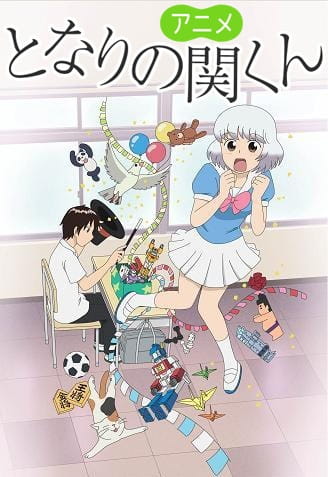 |
| From https://cdn.myanimelist.net/ images/anime/9/55489l.jpg |
Director: Yūji Mutō
Based on the original manga by Takuma
Morishige
Voice Cast: Hiro Shimono as
Toshinari Seki; Kana Hanazawa as Rumi Yokoi; Satomi Satō as Sakurako Gotō;
Shigeyuki Susaki as Takahiro Maeda
Viewed in Japanese with English Subtitles
In class, Rumi is constantly
distracted by Seki, who never is paying attention to lessons but always
indulging in peculiar or elaborate hobbies mid-lesson. Thus, as a micro-series
goes over twenty one episodes, seven minutes each, The Master of Killing Time is a perfect example amongst them of how
to use minimal lengths to an advantage. From those I have previously
encountered, there was one called Sparrow's
Hotel (2013) which, even if it has only three minutes per episode and
amusing, didn't take full advantage of its story of a former female soldier
working as hotel staff, whilst another about sentient farts, Onara Goro (2016), is weird enough to
be compelling but was looking like it was about to wear the joke thin if it
went any longer. And then Pop Team Epic
(2018), which was a fifteen minute episode repeated twice with differences
between the versions, has the issue of being so insular with its references the
humour's only gained for a few, and so chaotic it actually becomes less weird
than a premise which is straightforward but has a weird detail.
The Master of Killing Time in contrast takes an odd premise, of a
student who engages in increasingly bizarre activities instead of studying, and
repeats with the virtue of having his "straight man", white haired
and plucky schoolgirl Rumi, being pitched as the perfect foil, in both heart
and her comic reactions to his behaviour. It's one joke, as Seki go from
performing magic tricks to her to really odd pastimes, like setting up an
optician's mirror at his desk and trying glasses on he'll never wear, but he
has his own charms. He's also a sadistic at times, from playing his shogi set
off as soldiers by bashing the pieces, to his sausages at lunch being shaped
liked squid, thus creating a horrifying story of preservation being concocted
by Rumi as she imagines him a monstrous devourer of a benevolent race of
sausage squids.
Rumi is the reason the jokes
work, voice actress Kana Hanazawa a
shining star alongside everyone who both drew her facial reactions and came up
with her various flights of fantasy based on what Seki is doing. A friendly
chemistry is between her and Seki, never romantic, but a greater reward is to
be found in her hyperactive imagination when she over elaborates on the shogi
game, imagining a fantasy epic of betrayed kings and star-crossed lovers, to
the robot family, the one longer form running gag where Seki has three robot
toys, designed like a father and a mother and a child, who do thinks so
earnestly that Seki doesn't. This joke, in mind that The Master of Killing Time is a bright and warm work with some
clear craft behind it, but still economic in presentation, even gets a parody
of a classic vocal song usually found in old animated robot shows in Japan, a
reference you don't need to get when the song is so bombastic but the lyrics are
about everyone loving scrambled eggs and robo father sleeping in late.
 |
| From https://ikilote.net/Galeries/News/Anime/AR/ Tonari_no_Seki-kun_-_ep01_047.jpg |
Noticeably, with the seven minute lengths also including the opening and ending credits, a lot of the humour is able to work constantly as the joke is based on drawing it out over a long time, the elaboration and silliness based on the tension Rumi puts in her investment in the activities. The great structure is emphasised when a side character Sakurako Gotō gets to be the lead for two episodes; believing Rumi and Seki are actually romantically together, the two episodes are great themselves, particularly when she perceives a game of miniature golf on a larger shared desk is actually them engaging in some very personal romantic hijinks to her blushed shock.
It's a great example of creativity
in minimal resources, quite a well animated work but in that it uses the
limited movement of anime to its advantage, how the gags are based on sudden
shocked reaction in Rumi's voice or a sudden change in facial movement. Its
tells a lot from one joke, and to consider that the entire series, like the
source material, is based on simply this peculiar premise, the kind you'd be
hard to find in a lot of mainstream Western animation, is something to admire.
Obviously the premise is helped by being minimalist - baring Gotō and the robo
family, the only other true side character, whilst in populated classes, is Takahiro
Maeda, a student who is oblivious to the odd behaviour Seki is doing on the
desk behind him, even if it's using his back to represent a mountain for robot
toys to perilously climb.
The sense of personality even
comes around to the opening and ending credits too, not only in the good music
but what they repeat - playful pop over the opening, Seki elaborately animating
a scene of himself and Rumi like an actual anime production, the ending a
lovely jazz piece that, as he plays an improvised instrument from materials
like a pencil case, adds to the sense of Rumi secretly liking him for all his
irritating habits. That there is no real conclusion to the series, barring the
final episode adding the risk of him being caught for his shenanigans, isn't a
disappointment but a natural ending, that unless the manga took a different
direction, or amped the stakes to funnier heights, Seki is still going to be
doing this, and Rumi is going to always miss something off the board to write
down for her work.
 |
| From https://theglorioblog.files.wordpress.com/2014/03/seki-kun_6-9_4.jpg |
No comments:
Post a Comment